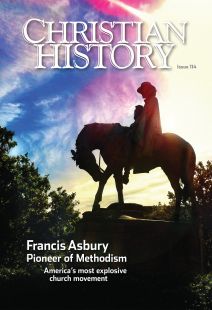The patriarch broods over his family’s future
WHEN ASBURY knew death was approaching, he mused on the future of the people called Methodist. In August 1813 he wrote a valedictory address to William McKendree, elected a bishop in 1808, in which he warned Methodists against settling down like other churches:
Alas for us! out of 700 traveling preachers, we have about 100 located in towns and cities and small rich circuits. Guard particularly against two orders of preachers: the one of the country, the other for the cities; the latter generally settle themselves to purchase ministers [pay high salaries], and too often men of gifts and learning intend to set themselves to sale.
I am bold to say that the apostolic order of things was lost in the first century, when Church governments were adulterated and had much corruption attached to them. At the Reformation, the reformers only beat off a part of the rubbish, which put a stop to the rapid increase of absurdities at that time; but how they have increased since!
. . . In the seventeenth century. . . the Lord raised up that great and good man, John Wesley, who formed an evangelical society in England. In 1784, an apostolical form of Church government was formed in the United States of America at the first General Conference of the MEC held at Baltimore, in the State of Maryland. You know, my brother, that the present ministerial cant [gossip] is that we cannot now, as in former apostolical days, have such doctrines, such discipline, such convictions, such conversions, such witnesses of sanctification, and such holy men. But I say that we can; I say we must; yea, I say we have. . . .
Schools, colleges, and universities undertake to make men ministers that the Lord Jesus Christ never commanded to be made . . . sent by their parents or moved by pride, the love of ease, money or honor. Are not such moved by Satan more than by the Holy Ghost?. . . We lay no claim to the Latin, Greek, English, Lutheran, Swedish, or Protestant Episcopal Church order. . . . Would their bishops ride five or six thousand miles in nine months for eighty dollars a year . . . preach daily when opportunity serves, meet a number of camp meetings in the year, make arrangements for stationing seven hundred preachers, ordain a hundred more annually, ride through all kinds of weather, and along roads in the worst state, at our time of life?
In January 1816, three months before his death, 70-year-old Asbury began an address to be read at the 1816 General Conference in May, encouraging Methodists to go on in the way they had begun. In the end his unfinished address was read along with his address to McKendree:
My loving confidential Sons in the Gospel of the grace of God, in Christ Jesus, great grace rest upon you. The God of glory cover your assembly and direct all your acts and deliberations for the Apostolic order and establishment of the Church of God in holy succession to the end of time. Only recollect as far as your observation or information will go, what God hath done by us in Europe and America in about 70 years in Europe, and less than 50 years in America, and what wonderful things he may do for us and our successors in future years if we stand fast in the Gospel doctrine and pure Apostolic ordination, discipline and government into which we have been called and now stand.—From The Journal and Letters of Francis Asbury
By Francis Asbury
[Christian History originally published this article in Christian History Issue #114 in 2015]
Next articles
The continent was their parish
Christian History talked with historian Russell Richey about who Methodists have been and how Asbury made them that way
Russell RicheyFrancis Asbury: Recommended resources
Where should you go to understand Methodists? Here are some recommendations from CH editorial staff and this issue’s authors
the editorsThe accidental revolutionary
In his quest for spiritual peace, Luther had no idea he’d leave his world in turmoil
James M. KittlesonCourse corrections
300 years before Luther, reformers were already trying to change the church
Patricia Janzen LoewenSupport us
Christian History Institute (CHI) is a non-profit Pennsylvania corporation founded in 1982. Your donations support the continuation of this ministry
Donate



